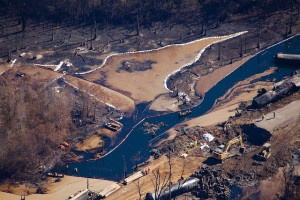We have much more to do and your continued support is needed now more than ever.
This Is All You Need to Know About How Much Big Oil Cares About Safety

Reuters has the details on the D.O.T.’s action:
The draft rules, which are subject to a 60-day public comment period, propose new tank-car braking systems, train-speed restrictions, more testing for volatile gases and liquids, and a two-year phase out of older tank cars that officials have said are prone to puncture and fire when derailments occur.
The rules follow an 18-month period which saw more than a dozen derailments of trains carrying crude oil, six of which led to major fires and one of which caused the death of 47 people in the Canadian town of Lac Megantic, in Quebec province.
We’re talking about one of the most profitable industries in history, yet Big Oil wouldn’t voluntarily take the basic steps listed here – safety testing, retiring the oldest and most dangerous old rust buckets. Instead, regulators now must force oil companies to act.
“While today’s action will help protect wildlife and communities from the severe dangers of transporting oil and tar sands by rail, it again shows the urgent need to move towards a safe, clean energy future,” says Jim Murphy, NWF’s senior counsel and our top expert on energy law. “The fact that oil companies need to be told to transport their toxic and explosive product in something safer than a tin can shows that this is an industry that doesn’t have the interests of wildlife, people or the health of our climate in mind.”
Remember, oil companies also would have us believe we need more tar sands oil pipelines because these oil trains are so dangerous. Yet even with a record year for oil train disasters in 2013, rail spills only barely kept pace with oil pipeline spills. When we hear TransCanada promise the Keystone XL tar sands pipeline will be safe, or Enbridge promise its aging pipelines in the Midwest and New England can be switched from crude oil to more corrosive tar sands, how many safety corners are they cutting?
![]() Help protect caribou and many more at-risk wildlife by sending a message urging President Barack Obama and Secretary of State John Kerry to say no to the Keystone XL tar sands oil pipeline.
Help protect caribou and many more at-risk wildlife by sending a message urging President Barack Obama and Secretary of State John Kerry to say no to the Keystone XL tar sands oil pipeline.






















